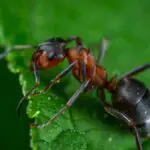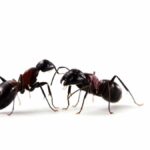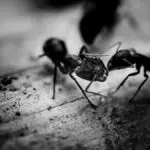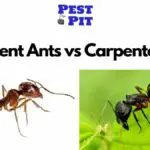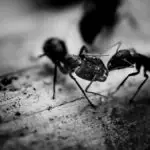There you are enjoying your summer when out of nowhere, you have an ant problem!
How did that happen?
When did that happen?
Why do ants suddenly appear in and around your home?
In this post, we will look at why ants are not there one minute and then infest your home in the next!
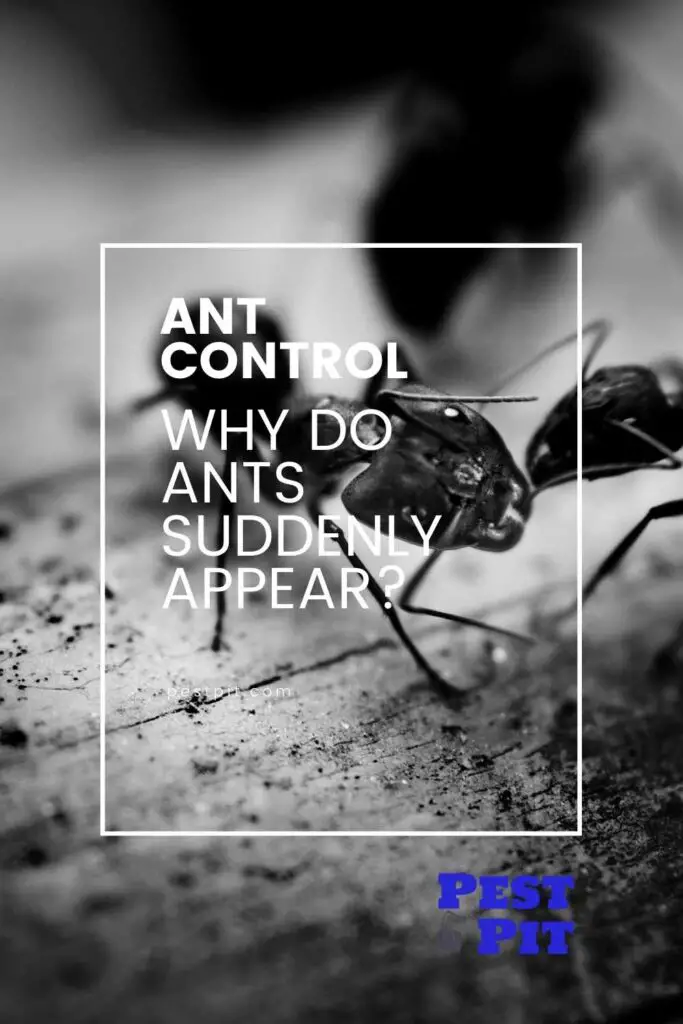
7 Reasons Why Have a Sudden Ant Infestation
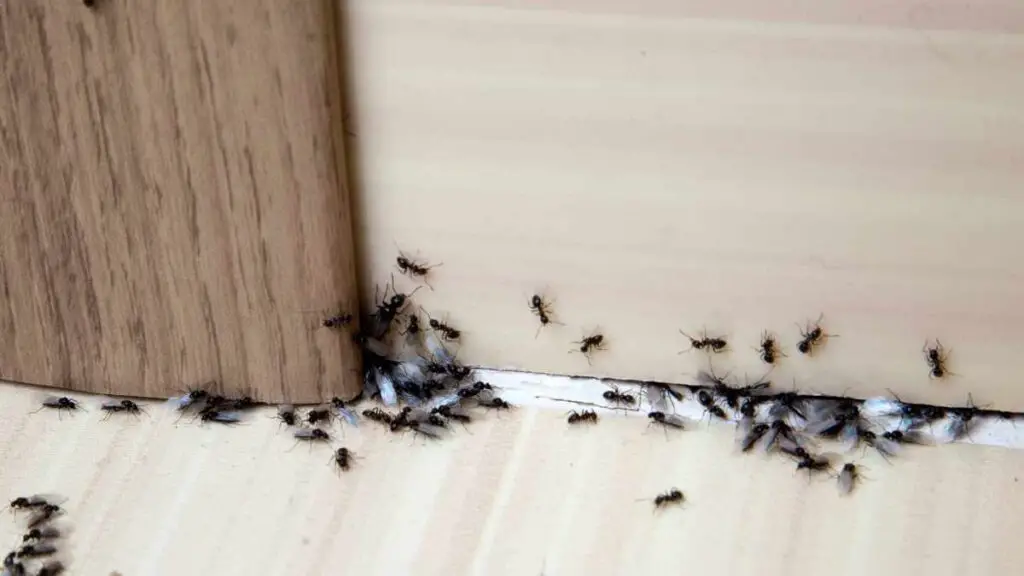
You have Water Available for Them
Water is an essential component of any animal’s survival.
An ant’s thirst can be quenched for an extended period by even a tiny pool of water. The colony of the ants will want to stay close to your kitchen if the water source is reliable.
Make sure you wipe up any water spills as soon as possible.
Check typical high-moisture places, including behind sinks, windows, refrigerators, and doorways, frequently to ensure you aren’t providing an oasis for these bothersome invaders. This may also be the reason why you have ants near your pool (if you are lucky enough to have one).
Extreme Weather
Research has shown that ant infestations are linked to the weather.
Infestations appear to be more likely during seasons of heavy rainfall or dry, hot, drought-like conditions.
The reason behind this isn’t entirely apparent.
One of the most likely explanations is that they avoid cold, rainy weather or have discovered a supply of water in your household throughout dry, hotter periods.
They are primarily inactive during the winter and colder climates but become more active in the warmer seasons.
Ant infestations are more common in cooler parts of any region.
Food Supply
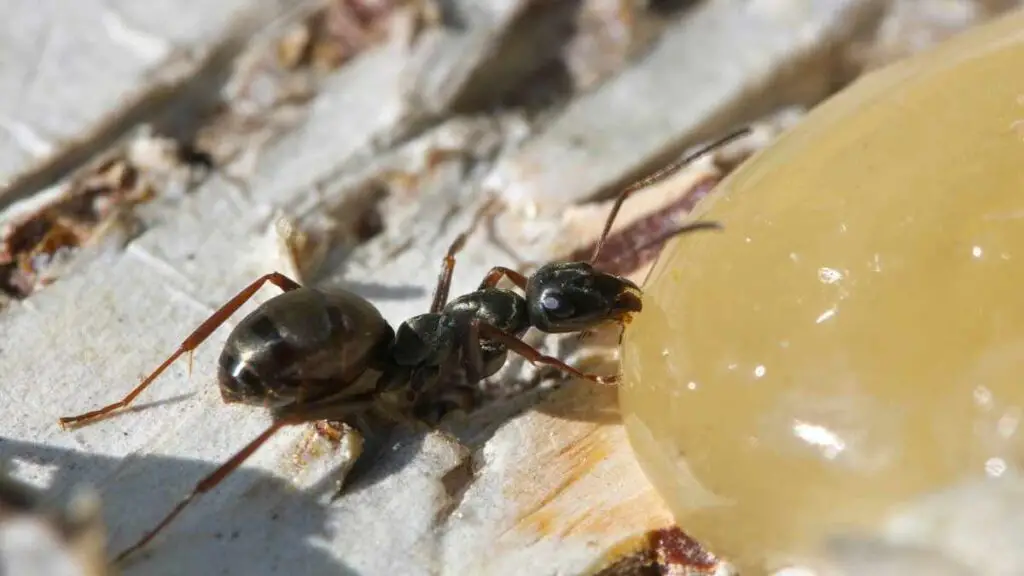
Ants mostly explore to locate food sources. Whenever any ant infestation occurs unexpectedly, the most likely explanation is that there is food for them someplace in your home.
The majority of ants are voracious predators, meaning they will consume almost everything.
They do, however, prefer desserts.
Ants are drawn to a variety of food resources that you may have on hand, including:
- Syrup
- Fruit Juice
- Honey (although it works in your favor when combined with borax!)
- Sugar
- Fats
- Meat
- Breadcrumbs
Colonies can create extensive trails of thousands of ants to link the colony to these food sources once they discover wherever they are.
They generate a fragrance signature for other ants by leaving a chemical trail with their pheromones.
They’ll keep coming until the trail is shattered.
Easy to Enter Properties
Ants, in the end, require a way in.
These tiny insects can get into almost any home; however, if your property is particularly insect-friendly, you’re most likely to get a full-fledged colony on your hands instead of just a couple of ants.
What are the ants’ methods of entry? Ant infestations are common in homes that have broken foundations or ancient, hole-ridden stonework.
They also can sneak in through inadequately sealed windows and doors, which is common in older homes or properties which haven’t been repaired in a long time.
So if you have ants on your porch, your yard, or garden then they might find a way of getting in.
Pet Food
It’s also not necessarily your food.
Since dog food is frequently left outside for extended periods, it can also attract ants.
While many individuals are concerned about their food, they often overlook pet food and are commonly left out in the open.
Ant invasions can be caused by dog food, cat food, or any other type of animal food.
A Nest Nearby
It’s possible that the issue isn’t with what’s in your immediate vicinity.
The problem may be that you have many holes and gaps on your land and ant colonies too close to your home.
You’ll need to hire someone to thoroughly search the property for neighboring colonies, remove these colonies, and then cover the holes where they’re coming in.
Ant nests could be anywhere, but mostly in your yard or near your home. Some ants have been known to nest in your home, so keep an eye out for ants coming out of wall spaces.
Hospitable Conditions
Even a pristine home can attract ants, as you can see.
They will, however, stay longer if they perceive your house to be particularly welcoming.
Ants will eat almost anything, although they are particularly interested in sugar and fat sources. They might be raiding your cupboard for honey and syrup or looking through your trash for leftovers, fruit, or bread.
Ants, like humans, require water to survive.
It just takes a small amount of water to maintain an entire community alive, so if your sink drops or your fridge collects moisture, your insects’ infestation will be delighted.
How Do Ants Get into Your Home?
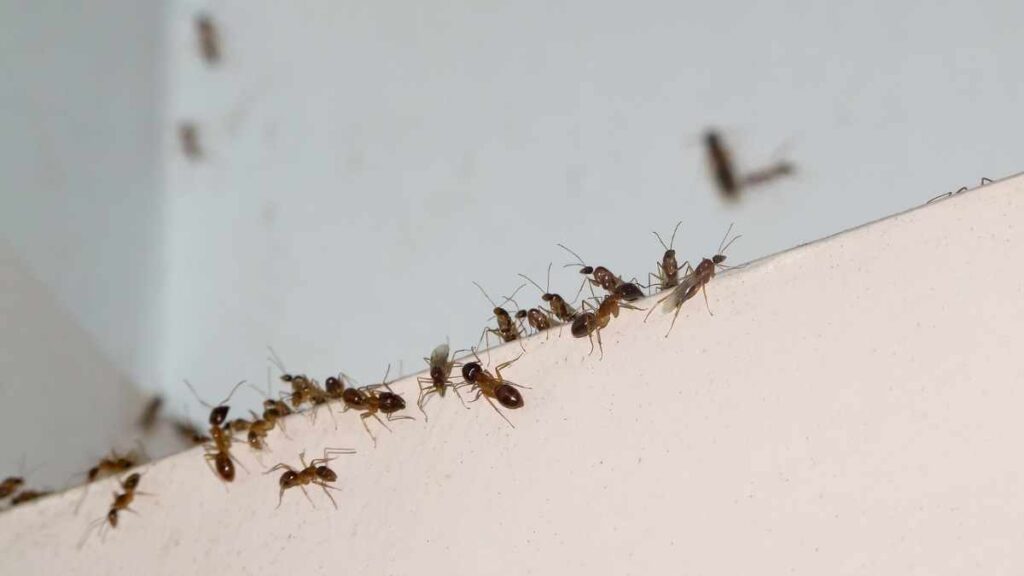
Cracks in Your Walls
Most houses are not hermetically sealed, which means there is some airflow between the inside and outside.
Air is typically exchanged via the seams of doors and ceilings, as well as vents and windows. These openings are big enough for insects to enter your household.
The place where a wall meets a floor, corner, or ceiling, check for such seams.
Also, look for spots where a doorway, outlet, sewage pipe, power line, or vent has been drilled into a wall. Ants can also enter your property through cracks.
Some construction materials, such as plaster and other older building materials, can develop structural fissures that serve as a highway for these insects.
Inside The Floor
Ants can also travel underneath your floor, which may not be evident.
They might have carved out a path beneath tile, carpets, and wood floors. It can be challenging to locate their entry point into a room if they are entering via flooring.
Furthermore, ants may use your subflooring as they migrate about the household.
Subflooring is commonly made of laminated pieces of plywood, which gives tiny ants plenty of room to explore.
Windows
While we love our windows for allowing daylight and fresh air into our homes, they might be allowing ants entry.
Ants can easily pass through open windows and screens with holes.
Aside from the window, the window frame may have gaps between the remainder of the wall, allowing ants to enter.
Glass windows can accumulate humidity, and the timber might deteriorate, making these regions ideal for ants of many species.
Doorways
Like humans, some ants will discover that the best method to enter a residence is via a door. Ants love to get in through doors that aren’t adequately sealed.
Inspect the seal at the base of the doorway and the edges and head of the door for quality seals. Some door sweeps might also help keep intruders at bay.
Another item to think about is any doorway that is not utilized very often. Seals may degrade, or fractures may form unnoticed because these gates get minimal traffic.
Ants and other insects can take advantage of these lapses.
Foundation Gaps
Almost all home foundations are sturdy; holes created during construction might make give ants an entry point.
Persistent ants can enter holes in foundations that aren’t solid concrete blocks to hunt for food, shelter, and water.
Houseplants & Toys
Ants can also be accidentally transported into a home.
For example, an ant colony can be attracted to a hollow toy left in the yard over the summer and subsequently taken inside. Plants that have been brought indoors for the wintertime may be the cause of an ant infestation.
You can bring large colonies of insects indoors on worn furniture or equipment, storage containers, hoses, pipelines, and even groceries.
Utility Lines
There are various small holes in your house with all the electricity, telephone, cable, water, and natural gas lines. Check for ant activity where your utility lines enter your home.
Any little pest can enter your home through gaps in which these lines are linked to your house.
Aside from bug problems, these openings can allow air into the house, putting a burden on your air conditioning budget.
Conclusion
When you do your own pest control, you will no doubt have to deal with ants! They are one of the most common pests you will need to deal with and one of the least threatening.
Getting rid of ants starts by understanding where they come from and why they suddenly appear in and around your property.
This post has given you a solid foundation into understanding why you have ants. Now it is up to you to get rid of them! Luckily, there are plenty of things you can use to get rid of ants. You can even use some household items.
Vinegar and lemon and good natural things you can use to get rid of ants too.
Good luck.

